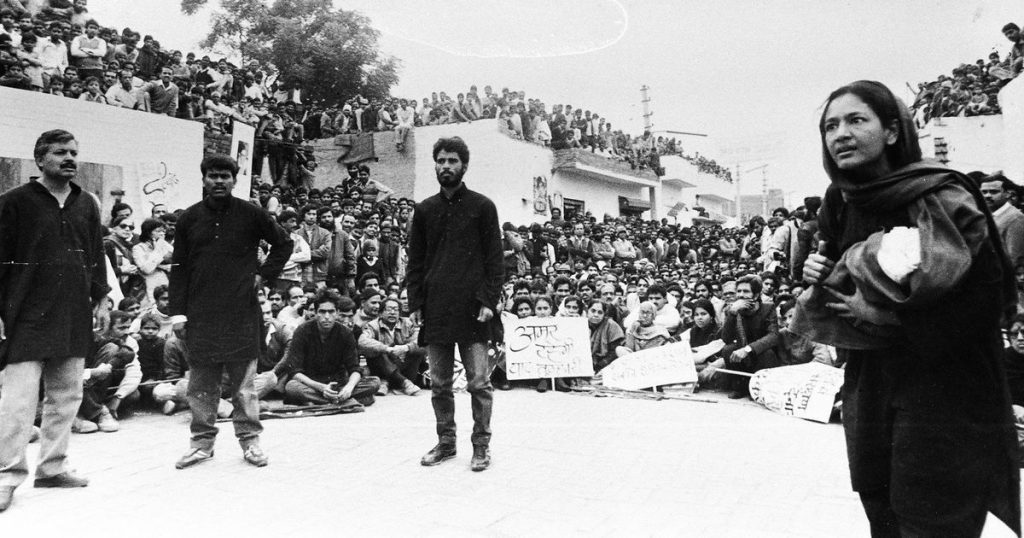Do not fear death so much, but rather the inadequate life —
Bertolt Brecht, famous German playwright, poet and director.
Playwright, director and political activist, Safdar Hashmi is best known for his contribution to the street theatre movement in India through the Jana Natya Manch (JANAM). Safdar, who would have turned 63 this April 12, was brutally attacked by a mob led by a Congress worker in 1989 at a street theatre performance of his play ‘Halla Bol’ (Raise your voice) during the Ghaziabad municipal elections. He died a day later. Thousands of people joined the 10-mile-long funeral procession on the streets of Delhi. This tragic incident was a fallout of the politics-crime nexus and intolerance of free speech. It signified that street theatre was not just a propaganda tool that could be used for promotion of products by advertising agencies, it had the power to stir emotions in society.
Street theatre originated to strengthen the voice of the weaker sections of society. It became a form of activism and people like Badal Sircar and Utpal Dutt redefined the meaning of anti-establishment plays. Safdar ably carried forward the tradition. Many eminent theatre artistes including Naseeruddin Shah and Nandita Das were part of that movement.
Safdar was multitalented and open to new influences and technologies. He penned a 24-episode tele-serial on adult literacy and women empowerment. Besides, he composed a number of songs and plays for children and designed posters for a number of mass organisations. He also conducted theatre workshops and played a key role in organising the first Ritwik Ghatak retrospective in Delhi. He was instrumental in rallying artistes and intellectuals at the time of the anti-Sikh riots in 1984.
Thirty years after his death, his contributions are remembered, and his voice still resonates in the theatre circuit.
Debananda Nayak (Soni), a member of the Street Theatre Action Group (STAG) formed in the 1990s, has written and directed a few plays including Dheek-E-Samaja, Raja Praja Nata, Munna and Ram Manohar. The entire theatre fraternity was in a state of shock when Safdar Hashmi was killed during a performance, he said, recalling the tragic incident. “I wonder what changes he would have brought in the field of political activism had his promising life not been cut short,” Soni added.
Narayan Pati, an alumnus of the National School of Drama, New Delhi and founder of theatre group Anwesana, said that Safdar Hashmi remains an inspiration. Narayan’s troupe started street theatre in Odisha in the early part of 1980s. He highlighted the police excesses against the agitating labourers in Paradip through his play. During the agitation, police shot down some labourers and threw the bodies in the sea, he said. “We highlighted this reality and the resultant public support and cash assistance we received for the family of the labourers is unforgettable,” he added.
Safdar’s activism has inspired several theatre activists to express themselves fearlessly. Thirty thousand shows were conducted April 12, 1989, on Safdar’s birth anniversary, when artistes decided to observe it as National Street Theatre Day, said Narayan.
“Safdar was an inspirational comrade for his mother Qamar Azad Hashmi. But for our generation, his was a quest for fearless expression,” said Radhakrushna, a technocrat who says his life changed after he read about Hashmi.
“I was asked by my seniors to lead our college’s ‘nukkad natak’ club when I was in the IIIrd year of B Tech. I knew I had to come up with some good ideas to hold the interest of my team. After much research and watching a lot of videos, I decided to do a play based on the life of Safdar Hashmi.”
“I was in awe of his songs, his most popular production Machine, his ideology. At the start, I was only in search of a project that I could use to impress my seniors. But my life changed after going through the life history of Safdar Hashmi. I discovered a new reason to do theatre. He is no more but many other Safdars were born with his killing. His wife Moloyshree is also an inspiration for many as she completed the half-staged play two days after Safdar’s death,” said Radhakrushna.
BIJAY MANDAL, OP
